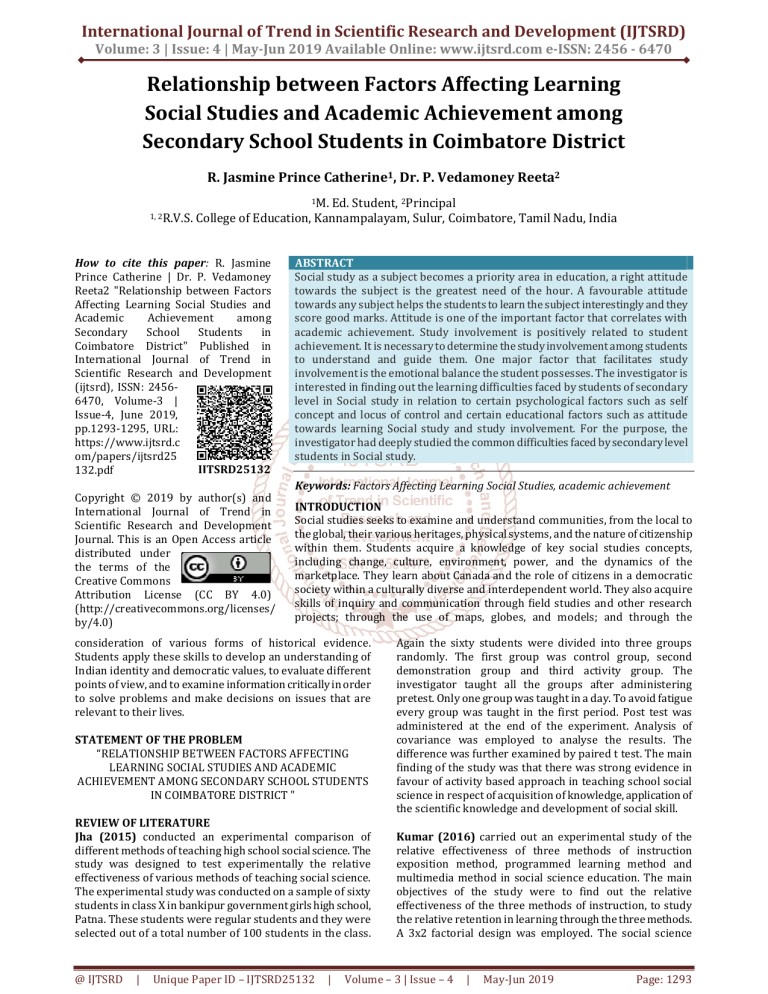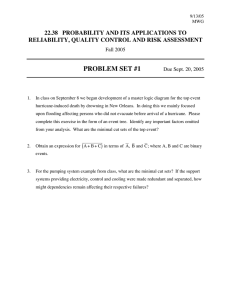
International Journal of Trend in Scientific Research and Development (IJTSRD)
Volume: 3 | Issue: 4 | May-Jun 2019 Available Online: www.ijtsrd.com e-ISSN: 2456 - 6470
Relationship between Factors Affecting Learning
Social Studies and Academic Achievement among
Secondary School Students in Coimbatore District
R. Jasmine Prince Catherine1, Dr. P. Vedamoney Reeta2
1M.
1, 2R.V.S.
Ed. Student, 2Principal
College of Education, Kannampalayam, Sulur, Coimbatore, Tamil Nadu, India
How to cite this paper: R. Jasmine
Prince Catherine | Dr. P. Vedamoney
Reeta2 "Relationship between Factors
Affecting Learning Social Studies and
Academic
Achievement
among
Secondary
School
Students
in
Coimbatore District" Published in
International Journal of Trend in
Scientific Research and Development
(ijtsrd), ISSN: 24566470, Volume-3 |
Issue-4, June 2019,
pp.1293-1295, URL:
https://www.ijtsrd.c
om/papers/ijtsrd25
IJTSRD25132
132.pdf
ABSTRACT
Social study as a subject becomes a priority area in education, a right attitude
towards the subject is the greatest need of the hour. A favourable attitude
towards any subject helps the students to learn the subject interestingly and they
score good marks. Attitude is one of the important factor that correlates with
academic achievement. Study involvement is positively related to student
achievement. It is necessary to determine the study involvement among students
to understand and guide them. One major factor that facilitates study
involvement is the emotional balance the student possesses. The investigator is
interested in finding out the learning difficulties faced by students of secondary
level in Social study in relation to certain psychological factors such as self
concept and locus of control and certain educational factors such as attitude
towards learning Social study and study involvement. For the purpose, the
investigator had deeply studied the common difficulties faced by secondary level
students in Social study.
Keywords: Factors Affecting Learning Social Studies, academic achievement
Copyright © 2019 by author(s) and
International Journal of Trend in
Scientific Research and Development
Journal. This is an Open Access article
distributed under
the terms of the
Creative Commons
Attribution License (CC BY 4.0)
(http://creativecommons.org/licenses/
by/4.0)
INTRODUCTION
Social studies seeks to examine and understand communities, from the local to
the global, their various heritages, physical systems, and the nature of citizenship
within them. Students acquire a knowledge of key social studies concepts,
including change, culture, environment, power, and the dynamics of the
marketplace. They learn about Canada and the role of citizens in a democratic
society within a culturally diverse and interdependent world. They also acquire
skills of inquiry and communication through field studies and other research
projects; through the use of maps, globes, and models; and through the
consideration of various forms of historical evidence.
Students apply these skills to develop an understanding of
Indian identity and democratic values, to evaluate different
points of view, and to examine information critically in order
to solve problems and make decisions on issues that are
relevant to their lives.
STATEMENT OF THE PROBLEM
“RELATIONSHIP BETWEEN FACTORS AFFECTING
LEARNING SOCIAL STUDIES AND ACADEMIC
ACHIEVEMENT AMONG SECONDARY SCHOOL STUDENTS
IN COIMBATORE DISTRICT "
REVIEW OF LITERATURE
Jha (2015) conducted an experimental comparison of
different methods of teaching high school social science. The
study was designed to test experimentally the relative
effectiveness of various methods of teaching social science.
The experimental study was conducted on a sample of sixty
students in class X in bankipur government girls high school,
Patna. These students were regular students and they were
selected out of a total number of 100 students in the class.
@ IJTSRD
|
Unique Paper ID – IJTSRD25132
|
Again the sixty students were divided into three groups
randomly. The first group was control group, second
demonstration group and third activity group. The
investigator taught all the groups after administering
pretest. Only one group was taught in a day. To avoid fatigue
every group was taught in the first period. Post test was
administered at the end of the experiment. Analysis of
covariance was employed to analyse the results. The
difference was further examined by paired t test. The main
finding of the study was that there was strong evidence in
favour of activity based approach in teaching school social
science in respect of acquisition of knowledge, application of
the scientific knowledge and development of social skill.
Kumar (2016) carried out an experimental study of the
relative effectiveness of three methods of instruction
exposition method, programmed learning method and
multimedia method in social science education. The main
objectives of the study were to find out the relative
effectiveness of the three methods of instruction, to study
the relative retention in learning through the three methods.
A 3x2 factorial design was employed. The social science
Volume – 3 | Issue – 4
|
May-Jun 2019
Page: 1293
International Journal of Trend in Scientific Research and Development (IJTSRD) @ www.ijtsrd.com eISSN: 2456-6470
students of classes IX and X of two inter colleges formed the
sample of the study. In all 180 students were divided into
three groups of sixty each. The findings of the investigation
were the multimedia was more effective than the
programmed learning method or expository method, the
programmed learning method was more effective than the
expository method, retention in learning by the multimedia
method was higher than the other two, retention in learning
by the programmed learning group and the expository group
was equal, there was no interaction between three methods
of instruction and the levels of intelligence.
METHOD OF THE STUDY
The present study attempts to find out the factors affecting
learning social studies and academic achievement of
secondary school students. Since the problem is concerned
with "Survey" type, the investigator has selected the
normative survey method for conducting the study.
The word 'survey' indicates the gathering of the data
regarding current conditions. The word "normative" is used
because surveys are frequently made for the purpose of
ascertaining which is the normal or typical condition or
practice. "Normative Survey" is applied in order to suggest
the two closely related aspects of study. The descriptive or
normative survey method of educational research is very
common. It is that method of investigation which attempts to
describe and interpret what exists at present in the form of
conditions, practices, processes, attitudes, beliefs etc. It is
concerned with the phenomena that are typical of the
normal conditions. It is an organized attempt to analyze,
interpret, report the present status of social institution,
group or area.
SAMPLE AND SAMPLING TECHNIQUES
Nine schools are selected through stratified random
sampling technique. The sample for the present study
consisted of 300 secondary school students in Coimbatore
district. The students of both sexes coming from both rural
and urban areas were included in the study.
TOOL USED IN THE STUDY
The data are essential for carrying out research
investigation. The data are collected with the help of the
special apparatus called as tools. The success of a research
must be received by selecting a proper tool for the research.
So, that the investigator used the following tool i.e. factors
affecting learning social studies and academic achievement.
DATA COLLECTION
In Coimbatore district, the investigator selected three
government schools, three government aided schools and
three self-financed schools using stratified random sampling
technique. A set of management students from each school
was selected in a random manner. Thus the researcher used
stratified random sampling technique for collection of data
from the vast area of Coimbatore district.
THE STATISTICAL TECHNIQUES USED
Suitable descriptive and inferential statistical techniques
were used in the interpretation of the data to draw to a more
meaningful picture of results from the collected data in the
present study from the following statistical measures were
used.
Mean
Standard deviation
@ IJTSRD
|
Unique Paper ID – IJTSRD25132
|
‘T’ test
‘F’ test
FINDINGS OF THE STUDY
1. It is found that, the male student’s factors affecting
learning social studies in Secondary school is found to
be less than that of female student’s factors affecting
learning social studies in Secondary school.
2. It is found that, the Tamil medium student’s factors
affecting learning social studies in Secondary school is
found to be almost same that of English medium
student’s factors affecting learning social studies in
Secondary school.
3. It is found that, the government, government aided and
matriculation school student’s factors affecting learning
social studies in Secondary school is found to be almost
same.
4. It is found that, the rural area school student’s factors
affecting learning social studies in Secondary school is
found to be greater than that of urban area school
student’s factors affecting learning social studies in
Secondary school.
5. It is found that, the literate parents of Secondary school
student’s factors affecting learning social studies is
found to be almost same that of illiterate parents of
Secondary school student’s factors affecting learning
social studies.
6. It is found that, the Hindu, Christian and Muslim
religions student’s factors affecting learning social
studies in Secondary school is found to be almost same.
7. It is found that, the OC, BC, MBC and SC communities
student’s factors affecting learning social studies in
Secondary school is found to be almost same.
8. It is found that, the male student’s academic
achievement in Secondary school is found to be less than
that of female student’s academic achievement in
Secondary school.
9. It is found that, the Tamil medium student’s academic
achievement in Secondary school is found to be greater
than that of English medium student’s academic
achievement in Secondary school.
10. It is found that, the government, government aided and
matriculation school student’s academic achievement in
Secondary school is found to be almost same.
11. It is found that, the rural area school student’s academic
achievement in Secondary school is found to be almost
same that of urban area school student’s academic
achievement in Secondary school.
12. It is found that, the literate parents of Secondary school
student’s academic achievement is found to be almost
same that of illiterate parents of Secondary school
student’s academic achievement.
13. It is found that, the Hindu, Christian and Muslim
religions student’s academic achievement in Secondary
school is found to be almost same.
14. It is found that, the OC, BC, MBC and SC communities
student’s academic achievement in Secondary school is
found to be almost same.
15. It is found that, there is a relationship between factors
affecting learning social studies and academic
achievement in Secondary school.
Volume – 3 | Issue – 4
|
May-Jun 2019
Page: 1294
International Journal of Trend in Scientific Research and Development (IJTSRD) @ www.ijtsrd.com eISSN: 2456-6470
CONCLUSION
Education is the process of socialization by preparing the
child for getting ready to take up the responsibilities of adult
life. Hence, it is sort of mental discipline for growth and self
activity. Education is the transmission of life by living,
through living and for living. The prime function of education
is to draw the potentialities of the child and develop them to
meet the challenging situations in life. Students have
problems in understanding the concepts in Social study.
Teachers must identity the difficulties among children,
should adopt innovative methods and use new technologies
in education. Teachers need to pay more attention in
developing positive attitude towards Social study and create
interest in learning Social study.
The attitude of Secondary school students towards factors
affecting learning social studies and academic achievement
students is found to be at the average level. The present
investigation has shown that the factors affecting learning
social studies and academic achievement of Secondary
school male students is lower than female students mean
score. Thus it could be concluded that teachers should
motivate the male students in their instructional classes by
providing guidance to enhance factors affecting learning
social studies and academic achievement.
The purpose of the present investigation with reference to
some selected variables of the study indicated significant
difference and relationship among certain variables. The
study may find some usefulness in the field of Social study
education and the findings of the study may serve as data for
future research.
@ IJTSRD
|
Unique Paper ID – IJTSRD25132
|
REFERENCE
[1] Agarwal, K.L. (1986) A study of effect of parental
encouragement upon the educational development of
the students. In Buch, M.B.(Ed.). Fourth survey of
research in education, New Delhi:N.C.E.R.T.,1991.
[2] Alexander, B.(1990) A study of the relationship of
critical thinking, social science aptitude and socioeconomic status to the social science achievement of
second year P.U.C. students. Fifth Survey of Research in
Education. New Delhi:N.C.E.R.T., 1997.
[3] Baskaran,K. (1991) Achievement motivation, attitude
towards problem-solving and achievement in
mathematics of standard X students in Devakottai
educational district. Fifth Survey of Research in
Education. New Delhi:N.C.E.R.T., 1997.
[4] Chaganlal, N.M. (1992) A study of the value,
adjustment, attitude towards teaching profession and
academic achievement of teachers children as
compared to non-teachers children. Fifth Survey of
Research in Education.
[5] Dani, D.N. (1984) Scientific attitude and cognitive
styles of higher secondary students. In Buch, M.B.(Ed.).
Fourth survey of research in education, New Delhi:
N.C.E.R.T.,1991.
[6] Darchin, P. (1989) A study of social science
achievement, social science attitude and problem
solving ability among the secondary school students in
the Aizawl. Fifth Suruey of Research in Education. New
Delhi: N.C.E.R.T., 1997.
Volume – 3 | Issue – 4
|
May-Jun 2019
Page: 1295




